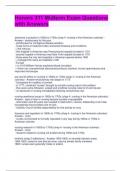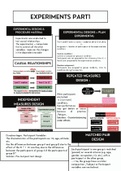Honors 311 Midterm Exam Questions
with Answers
advances in practice in 1600s to 1700s (chap 4- nursing in the American colonies) -
Answer-- almshouses for the poor
- penthouses for contagious disease isolation
- crude forms of treatment often worsened illnesses and conditions
+ like mercury
- first hospital in American was Pennsylvania hospital founded in 1751
- second hospital in American was New York hospital founded in 1791
- these were the only two hospitals in American opened before 1800
+ managed the same as hospitals in GB
- Europe
+ in 1619 William Harvey explained blood circulation
+ Anton van Leeuwenhoek discovered protozoa, bacteria, human spermatozoa and
improved microscope
war and its effect on nursing in 1600s to 1700s (chap 4- nursing in the American
colonies) - Answer-revolutionary war began in 1775
- ill prepared for realities of combat
- in 1777, untrained "nurses" brought to provide nursing care to the soldiers
- they were camp followers: unpaid and unofficial nursing roles for ill and injured
- no advances in nursing immediately following revolutionary war
nursing workforce issues in 1600s to 1700s (chap 4- nursing in the American colonies) -
Answer-- idea of men in nursing became socially unacceptable
- reformation and 30 years war resulted in destruction, closure, disbanding of all-male
monasteries that provided care for sick
- Catholic Church shifted responsibility for this activity to nuns
licensure and regulation in 1600s to 1700s (chap 4- nursing in the American colonies) -
Answer-- none
- nurses not licensed or formally regulated in any way during 1600s or 1700s in
American colonies
nursing research in 1600s to 1700s (chap 4- nursing in the American colonies) -
Answer-- none
- research related to nursing not evident during 1600s and 1700s
timeline (chap 2-reflections) - Answer-1600-1800: no formally trained nurses
1660-1800: cared for and died at home, care by female family members
1800: nurses were generally males or sisters
,key people (chap 2-reflections) - Answer-Ancient Egypt: mummification (used in Civil
War to ship bodies home), dental health, sophisticated procedures
Far Eastern: energy work, acupuncture, herbals
Islamic: four humors (black bile, yellow bile, phlegm, blood)
Grecian: Aesculapius (god of healing, is were staff came from in medical symbol with
snake), Hippocrates
Medieval: hospitals, lay caregivers
determining what a nurse is (chap 2-reflections) - Answer-- word nurse derived from
Latin "nutrire" meaning to nourish
- originates from Latin noun "nutrix" defined as nursing mother
- early eras women were wet nurses
- term "nurse" evolved to mean caretaker of the sick
- within the profession, term nurse describes nurses who are licensed as:
+ Registered nurses (RNs), practical nurses (LPNs), vocational nurses (LVNs)
+ CNA is not a nurse because not licensed
- in 1893 Lystra Gretter (American nursing instructor) scripted the Nightingale Pledge
+ recited by nursing students at graduation, like doctors with Hippocratic Oath
- Jean Watson (1985) defined a nurse's work as transpersonal caring that demands "the
nurse is able to form a union with the other person on a level that transcends the
physical, ensuring there is a freeing of both persons from their separation and isolation"
during a health event
- nursing is a profession associated with caring
- nursing is now a profession associated with science
- today nurses practice in three realms:
+ delegated (to a CNA or a lower ranked nurse like an LPN)
+ independent (on own, decision to do vital signs, to restart an IV, using "standing
orders")
+ interdependent (with other professionals or doctors)
historical observations and outcomes (chap 2-reflections) - Answer-- future of nursing
dependent on belief that no nurse walks alone (collar, team work)
- nursing practice environment described in relation to one of seven concept trends
- nursing embraces professional diversity of gender, generation, culture/tradition, creed,
ethnicity, sexual orientation, and sociopolitical affiliation
- need for research determined as essential solution to generate new knowledge and
substantiate the work of nurses
+ use evidence based practice, not tradition, to guide practice
- nursing complex process of technical and cognitive skills interwoven with art of
compassion and science of evidence based practice
+ art and science
+ clinical (skills) to apply to practice (theories)
- Florence Nightingale: pioneer of modern nursing, innovator, nurse researcher, author,
activist, consultant
- today registered nurses utilize nursing process in clinical settings
, + SOAPIE or ADPIE
+ leads to improved practice through observation, intervention, evaluation of outcomes
- early civilizations and peoples have little or no documentation about actual work of
medical workers
+ ex: Civil War diaries say little about care
- findings through historical research, sociology, anthropology, archeology
- historical research: economics or politics in regards to social, traditional, or cultural
contexts of a specified period of time
+ not traditions, use research, apply it to practice
- 1900: American Journal of Nursing
- 1950s: first scholarly journal, Nursing Research
- historical reflection adds significance to nursing knowledge as we better define,
distinguish, identify nursing's relationships concerning research, knowledge, theory, and
practice
seven trends in nursing (chap 1) - Answer-image, education, advancement in practice,
war, workforce issues, licensure/regulation, research
- trends influence each other/intertwined, there are unique aspects related to each trend
image of nursing (chap 1) - Answer-- mass communication and entertainment have lead
to generalized impressions related to nurses and the nursing profession (good or bad?)
- popular public perception of nurses influences:
+ how nurses are treated by patients, other healthcare professionals, and the public
+ how nurses perceive themselves and the profession
+ how they treat each other in the workplace
education of nurses (chap 1) - Answer-early nursing education was:
- family members and tradition
- apprenticeship and observation
- educated by physicians and nurse supervisors
formal methods emerged as result of work of nurse leaders in Europe and the US
+ nursing did not exist in the US till after the civil war
- progression of nursing education resulted in educational degrees that determined role
or function, certification, and practice
advances in practice (chap 1) - Answer-- advances in healthcare technology
- development of new practice approaches/disciplines to effectively treat healthcare
concerns
- technological advancements:
+ influence and improve outcomes
+ fast-paced changes to nursing practice
- sociopolitical and healthcare environments
+ influence practice trends
+ necessity of practice advancement
- new practice approaches/disciplines developed over time to address specific client
concerns





